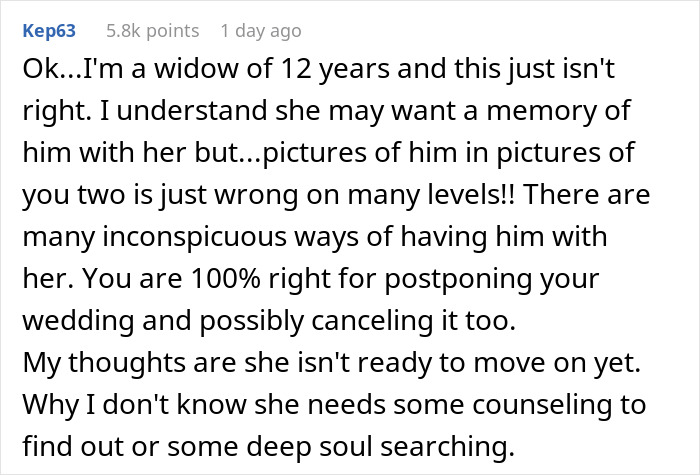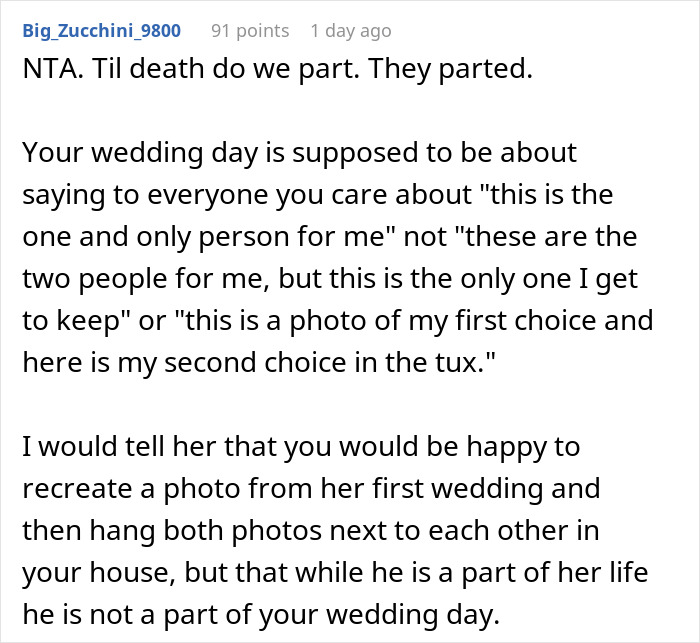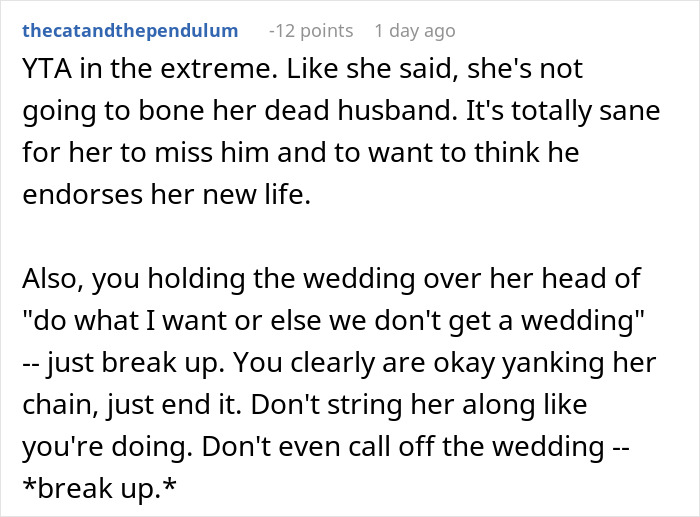There is hardly anything more painful than losing a loved one. If they were your spouse, their passing leaves you feeling hollow, and as though the very foundations of your life are shattering. While healing and finding love again is possible, it takes time. However, in some cases, people find it impossible to fully recover from their grief and move on.
This can make things very painful for their new partners. An anonymous man recently begged the r/AITAH online community for advice. He opened up about how he decided to postpone his wedding after his fiancée demanded to have her late husband’s photo everywhere at the ceremony and reception. Scroll down for the story and how the internet suggested navigating this emotional minefield.
Grief is a very personal thing and there’s no ‘timeline’ for healing. It can take a long time to recover from losing a spouse

Image credits: Nataliya Vaitkevich / Pexels (not the actual photo)
An anonymous man revealed that he postponed his wedding after the bride-to-be’s wish to have her late husband’s photo in the ceremony




Image credits: Mikhail Nilov / Pexels (not the actual photo)


Image credits: Anonymous

Image credits: Alex Green / Pexels (not the actual photo)
Everybody grieves differently and heals at a different pace
It’s natural that somebody wants to respect the memory of their late spouse. If the marriage was good and lasted a long time, then their partner probably became a core, inseparable part of their daily life.
That being said, there is a big difference between remembering your former partner fondly and putting them front and center at your next wedding. Keeping their memory alive does not have to come at the cost of your new partner’s trust in you.
If your new partner believes you care more about your late spouse than them, then your relationship is built on shaky ground. Unfortunately, the author of the viral internet story deleted their account, so we were unable to reach out to him for further comment.
Therapy or grief counseling can help you come to terms with your loss in such a way that you don’t feel guilty about living and loving when your spouse is no longer here. But there are no shortcuts: therapy takes a lot of tough emotional work with oneself. And everyone heals at a different pace.

Image credits: Felipe Cespedes / Pexels (not the actual photo)
You mustn’t run or hide from whatever feelings you feel after losing a loved one
Verywell Mind explains that the five most stressful things we can experience in life are the death of a loved one, divorce or separation, moving, long-term illness, and losing your job.
It’s natural and valid to feel shocked, confused, angry, numb, sad, or even guilty after losing a loved one. It can be tough to even begin to process what happened.
There is no ‘right’ or ‘wrong’ way to react to a loved one’s passing. And everyone grieves differently. It’s essential that you allow yourself to feel whatever it is that you’re feeling. Your goal shouldn’t be to go through the often-heard but cliché five stages of grief; your aim should be to feel mentally at peace.

Image credits: RDNE Stock project / Pexels (not the actual photo)
Your family and friends can create a powerful support network to help you slowly recover
You need to feel comfortable to take all the time that you need to recover from your loss. Sharing your feelings with the people closest to you can help you. Their emotional support can be a huge boon.
What also helps is them lending a hand with very practical things like helping you clean and cook. From a very utilitarian perspective, their empathy and assistance can show you that life goes on even should the worst happen.
The last thing you should do is to isolate yourself socially, even if that’s what you feel like doing. The National Institute on Aging warns that loneliness and social isolation are tightly linked with serious health problems like heart disease, depression, and cognitive decline.
Furthermore, socially isolated individuals are at higher risk of developing high blood pressure, dementia, becoming obese, having weakened immune systems, and becoming anxious or depressed.
Many readers were worried about the groom. They stood in support of his decision not to get married just yet
















Not everyone saw the situation from the same perspective. A few internet users were highly critical of the groom’s reaction











